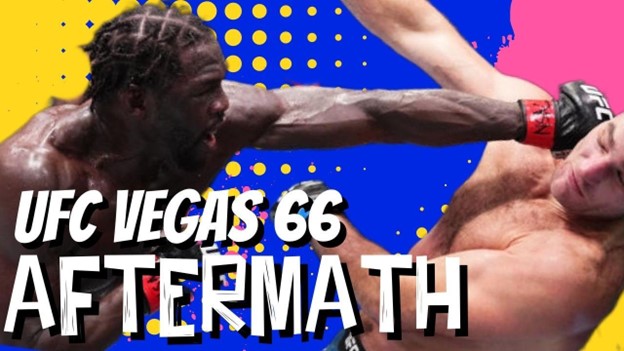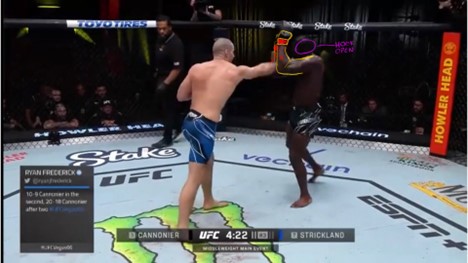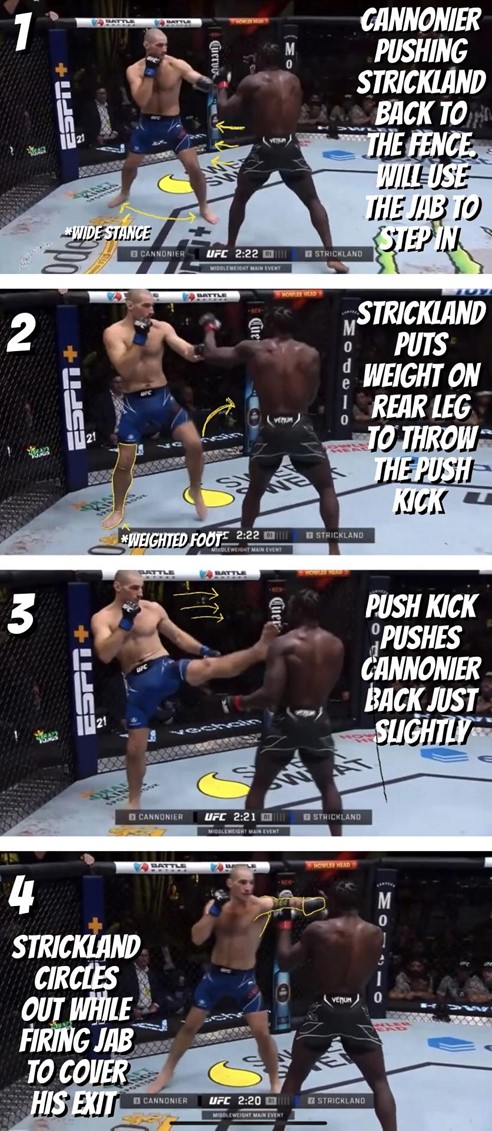
Blaine Henry/Sherdog.com illustration
Sean Strickland: Diversity Matters
Strickland didn’t really get beat up at “UFC Vegas 66,” but he absolutely did not win the fight either. He was forced to deal with Cannonier who for all intents and purposes put forth a solid game plan for dealing with what Strickland brings to the table. Strickland struggled with the high-guard shell as well as the constant stance switching of Cannonier. While Strickland lost, however, he didn’t give a bad account of what he was. Strickland’s problem is that he doesn’t really change who he is or how he fights; he goes in and fights how he thinks he should fight and doesn’t really make adjustments on the fly.

Blaine Henry/Sherdog.com illustration
The biggest trouble Strickland had was with Cannonier’s high guard. With Strickland being so jab-happy, Cannonier decided to keep his hands high and make the jab ineffective. Normally the high guard is dealt with by utilizing lead hooks that loop around the guard to land. Instead, Strickland just kept punching his foe’s arms as Cannonier came forward looking for big shots.
The root of why Strickland loss basically lies in the fact that he didn’t adjust how he fought, while Jared Cannonier made adjustments to win. While going in to “fight your fight” is a legitimate way to win—think Khabib Nurmagomedov and his wrestling-heavy attack—Strickland’s “specialty,” if you want to call it that, simply isn’t good enough to force the best of the division to bend to his will.

Blaine Henry/Sherdog.com illustration
We did learn some things about Strickland, however, that can be taken into account the next time he fights. We know he is good off his back foot and will be content to jab backing up followed up by the occasional cross. But when a fighter cuts off the cage and pushes Strickland backward, he will use the push kick to intercept a fighter stepping in and use the landing as an opportunity to escape. We can see that in action in the figure above. In the second figure, (1) we see Cannonier pushing back Strickland to the fence. Here, you will notice Strickland adopts a wider stance, this will set up the push kick. (2) As soon as Cannonier steps in with the jab, which is used to close distance, Strickland shifts his weight to his back foot and prepares to flick his lead foot up to intercept Cannonier. (3) As Strickland fires the teep, Cannonier steps back, stopping his forward pressure, and giving Strickland a moment and space to exit the pressure. (4) Finally, to do so, Strickland fires off the jab to provide him cover fire from any more forward pursuit from Cannonier. This push kick against the fence is one of the small nuances that Strickland uses to control the distance in the cage.
In Beforemath, we talked about how Strickland doesn’t traditionally move his head when he fights, instead opting to keep himself out of harm’s way with his footwork and that he subsequently likes to use that footwork to stay in the pocket and return fire. Against Cannonier, he did a decent job of that as well.
Blaine Henry/Sherdog.com illustration
With Cannonier stepping in, Strickland did a good job of seeing when punches are coming and responding to that with a step out the way, especially to the rear. In figure 3, (1) Cannonier comes to step in on Strickland and look for something big. (2) Strickland, who has a gauge on the distance, steps back and (2) looks for the check hook. But he notices that Cannonier has dropped his left hand and is providing a lane for the right. With his hips bladed in conjunction with the dropped hand of Cannonier, Strickland can turn over his hips on the cross, (3) which he does and lands clean as he walks Cannonier on to the punch.
Going forward, I would like to see Strickland take the initiative on leading the dance in the cage. Far too often, he’s fighting off the back foot. We’ve seen training footage of Strickland hunting down his sparring partners but in the cage, he’s been too passive. It is understandable, considering some of the power punchers he’s taken on, but using the jab to get in on the body and opening up the shots to the head would be a great addition to his game and help him not lose fights like these.
Jared Cannonier: Not Pereira, Not Adesanya, But Still Technically Sound
Cannonier’s win at UFC Vegas 66 was a huge deal. Traditionally seen as a banger who can put the lights out with a single punch, Cannonier has made great strides in improving himself technically. In his fight with Israel Adesanya, Cannonier set out to match Adesanya’s stance switching from southpaw to orthodox and back and take away half of the champ’s weapons. Unfortunately for Cannonier, he wasn’t as strong in that department, and you could tell that he wasn’t quite comfortable switching as often as Adesanya likes.
In the five months since his shot at the title, Cannonier has shown great improvement about knowing when to switch. In fact, the real factor in the stance switching for Cannonier on Saturday was that he wasn’t responding to Strickland changing stances then changing to match, but instead was leading the dance and was deciding when to fight southpaw and when to fight orthodox. While the stance switching didn’t really take away Strickland’s weapons, it kept Cannonier’s offense fresh for the entire fight.
While Strickland is the one known as the cardio-based fighter, it was Cannonier in Rounds 4 and 5 pushing the pace on a tired Strickland. This is due in part to Cannonier’s experience in five-round fights, going the distance a couple times and preparing for even more, but the real x-factor in the cardio was Cannonier’s body work. He did well by using the jab to the solar plexus of Strickland. While Strickland was in good shape for this fight, he was noticeably more tired near the end of this fight after the body of work (pun intended) of Cannonier added up.
Blaine Henry/Sherdog.com illustration
In fact, Cannonier used his stance switching to get some offense going against Strickland instead of using it defensively. In figure 4 above, we can see that in action. (1) Cannonier starts the exchange with Strickland in orthodox. For the newly initiated, that means Cannonier has his left hand and foot forward and his right hand is his power. Southpaw is simply the opposite. (2) To switch stances, Cannonier changes levels, which was set up by his repeated jab to the body discussed earlier. In the level change, Cannonier takes a big step forward with his rear foot, effectively taking him from orthodox to southpaw. (3) You can see Cannonier even take a little page out of Pereira’s book with the feint to the body with what was formerly his jab hand and now his cross due to the stance switch. Strickland, once again, parries it down and away, or so he thinks. With the hands of Strickland down, (4) Cannonier throws a lead right hook out of southpaw that lands on Strickland and backs him up.
Throughout the whole fight, Cannonier used tricks like this to have attacks coming from different angles to keep Strickland guessing where to parry, what to parry and where the power shots would come from.
Blaine Henry/Sherdog.com illustration
One of the hardest parts of fighting Strickland is the distance. He always has a good read on the distance and knows when he can exit an exchange. To deal with that, Cannonier set out to catch Strickland not before he is on his way out, but instead he made Strickland move in a direction he chose and kicked where he was going to be. (1) With Strickland backed to the fence, Cannonier will have to deal with the motion and the push kick from Strickland. Instead of accepting the push kick where he must back up, (2) Cannonier steps in as if to throw a bomb. Strickland will bite. On the feint, Strickland will exit to his left, right into the power leg of Cannonier. Instead of kicking a stationary target, Cannonier (3) kicks were Strickland is going to be and lands a heavy kick after heavy kick on Strickland and he would do so over the course of the fight.
Finally, let’s talk that high guard of Cannonier. In the frame from the beginning of the article, we saw Strickland struggle to realize that he could punch around the side of Cannonier’s high guard. Against a more diverse boxer like Pereira, Adesanya and Whittaker, this would have happened, but Cannonier bet on Strickland being himself and failing to adjust. It worked wonders. With the high guard, many of Strickland’s jabs hit the arms of Cannonier and didn’t find the mark, despite what the stats on the UFC’s website say. Punches that hit the guard really don’t count. They didn’t cause any damage and they let Cannonier get in on Strickland to land the offense he wanted. In conjunction with the high guard, Cannonier used Mike Tyson’s peek-a-boo head movement that saw him moving side to side. Being a power puncher, Cannonier also kept his power base in doing this, making him dangerous at all times.
It was Cannonier’s willingness to come forward against an opponent who backed up constantly that made the difference in the final two rounds. That forward pressure showed the judges that Cannonier wanted to win the fight and was doing what he needed to do just that. When the rounds are razor close as they were, and strikes literally identical going into the final round, it’s this this distinction that let Cannonier come out the victor.
Because he’s lost to Whittaker and Adesanya, Cannonier is still in a gatekeeper role for the middleweight division. While the direction of the division is shaking out with rumored Costa-Whittaker fight and Pereira-Adesanya fights in conjunction with Marvin Vettori vs. Roman Dolidze, Cannonier will want to wait for who is next for him in the scope of the middleweight title picture.

